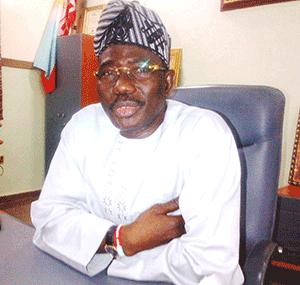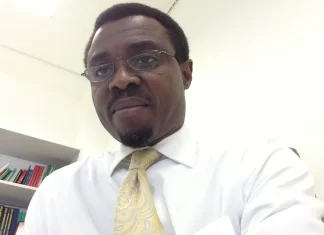DOMINGO OBENDE, who represents Edo North Senatorial District in the National Assembly, speaks on challenges of lawmaking in Nigeria, Edo Assembly crisis and his 2015 agenda. Special Correspondent, TITUS OISE, presents the excerpts.
Challenges in lawmaking
Domingo Obende
One of the major challenges we have had is the issue of tradition and culture as well as religion. In whatever bills you are bringing into the chamber, you must first of all make sure it doesn’t affect the people’s religion; it doesn’t affect their culture, especially their tradition. I see it as a challenge because where you want to regulate the system, and have a common law binding everybody, I will give specific preference to religion, culture and tradition.
Ifeel that we should be able to regulate even religions because of what is happening in the world. The Boko Haram you see today is a product of religion; take it or leave it. It might be used politically, but it is a product of religion. When you come down to the South, the Movement for the Emancipation of the Niger Delta (MEND), that is the Niger Delta militants you see today, is a product of culture. If you don’t tie it to culture, you tie it to tradition, and if you don’t tie it to tradition, you tie it to the society. You find out that all these things are intertwined. But the moment we cannot bring them under a common law, then like I said, I find it as a challenge.
Impeachment of Murtala Nyako and other developments in Adamawa
I don’t think I seriously understood what happened that led to that impeachment. It’s like seeing the result, not knowing the foundation or the genesis of the problem. But before the lawmakers contemplate an impeachment, there must have been breach of governance, breach of the law, or maybe the executive might have offended the sensitivity of the lawmakers. Something must be wrong somewhere. They are either doing it normally as lawmakers or they are doing it under the influence of some sort. If you think about it, I believe that these lawmakers were the same lawmakers that went with him to ACN (Action Congress of Nigeria) then, now APC (All Progressives Congress). They are the same people.
What has suddenly gone wrong? I am of the view that every executive must have the capacity to interface with the legislature, because the lawmakers are the foundation or grassroots of which they intend to develop. If you don’t have relationship with the lawmakers, how then will you develop their areas? We are here today at the National Assembly; we go home to say we are doing constituency projects. If we have no interface or relationship with the executive, we don’t have any need to have what is called constituency projects.
I believe that every sickness has its own cure. Whatever must have gone wrong in Adamawa, I don’t know. But somebody has been impeached, and if he feels that he has been impeached wrongly, the best place to go is the court. That is what I can contribute on that.
Regulating the power and relations between executive and legislature
You know I said something about the challenges in the National Assembly, vis-a-vis lawmaking whereby there are impediments such as culture, tradition, religion, and all of that. It is the same thing playing out among the executive, the legislature and the judiciary. The executive has the knife and the yam. The judiciary, I don’t know whether they have anything. The legislature, I don’t know if they also have anything. I will tell you why. This has to do with society that we find ourselves in, where people believe that stomach infrastructure must be the first foundation of having to govern you well, where the real issues that will grow the economy of the community is not discussed, where the real issue of building capacity for every individual at every local government – so that we will not be beggars in this country – is not taken seriously.
Everything you find in governance has political connotation, and I will tell you why. If something does not please the executive, that is when the political party will know that its members are more than the opposition, so they are called for a meeting – to go and support that person tomorrow, by force. When they come, they have no choice than to support what they naturally would never support on a good day. And if they don’t, they are so convinced that in the next election, they will never field them.
It is because our democracy has not grown to that point. When we make laws, if they affect the executive, they can ignore them. If they favour them, they can just go ahead and implement them and you think they have respected you. The issue has to do with when we are going to start knowing that the moment people are voted for, they should be allowed to do their Jobs. The moment we fail to appreciate that, it will be difficult for anything to change.
The lawmakers are there to make the laws, the judiciary is there to interpret the laws, and the executive is there to execute the laws. The moment we cannot allow these three to function independently and interactively, then there is no good government. The truth is that the judiciary, legislature and executive are in the government to form one government. That is why it is called the three arms, and without these arms collaborating, it will be difficult to have good government.
Constituency projects for Edo North
We have done some empowerment programmes where we have touched up to 600 human beings, ranging from market women to farmers and also semi-skilled people. We have been able to encourage some cottage hospitals in Edo North senatorial district, building of classrooms and town halls in our senatorial district. We are trying to encourage, maybe the rehabilitation of roads and, of course, streetlight in our senatorial district.
We have also contributed immensely to affordable power, which has to do with the transformers that we have been able to distribute round our senatorial district. All these and more, we have done and are still doing. I must say clearly that the challenges we have in our constituency projects have to do with the release of funds by the government. The executive have not achieved up to 50 per cent of any budget since we started this dispensation, and if they have not achieved up to 50 per cent, that means that our constituency projects have equally not been executed up to 50 per cent, because it is what you have that you give to them. What they are releasing is what is released to you.
There are a lot of companies that even came to work in our senatorial district more than 11 months ago. Government still owes them. In other words, some projects have come and gone and we are in another budget now. So these are challenges we face in covering constituency projects.
Edo House of Assembly crisis
There is hardly any House, or any Assembly, that you have for four years without crisis. My suggestion and advice is that, when there is crisis like that, it should be purely seen as internal; they should allow that arm to handle itself. The moment there is external influence, the problem escalates, and the moment it escalates, there is confusion, and when there is confusion, you have breakdown of law and order. When that also happens, it could go ahead to affect the development of our state.
I don’t think Edo is too young, from the path of the development that we are coming from, to encourage this crisis, all in the name of change of government, which, to us, might be practically impossible, because Edo has no governorship election until 2016.
Why are we starting the crisis now? What is the crisis going to do for us? Are we saying that we want to fight ourselves until 2016? That is a question. You don’t forget that it is coming from the backdrop of the congresses that took place in the APC and the national convention whereby a couple of people were disgruntled. But I know that nobody can have it his way all the time in politics. If it is your turn today, cooperate with others, so that when it is their turn tomorrow, they will also cooperate with you. That is my take on this.
Preparing for 2015 elections
The 2015 election is going to come, and it will go. Those who have God on their side will live to see it and they will live to testify. We don’t have any weapon of our own, but we have God and we have the weapon of the people, which is their thumb, in which they will use in voting good things to happen in their communities. I have given the best that I know I can. That has created a foundation in every sphere in Edo North. All I am asking is just a consolidation of the much that I have given and that can only be done if I must have benchmark on February 14, 2015, when there will be an election again. And I know, with the good people of Edo North, victory is going to come our way.













